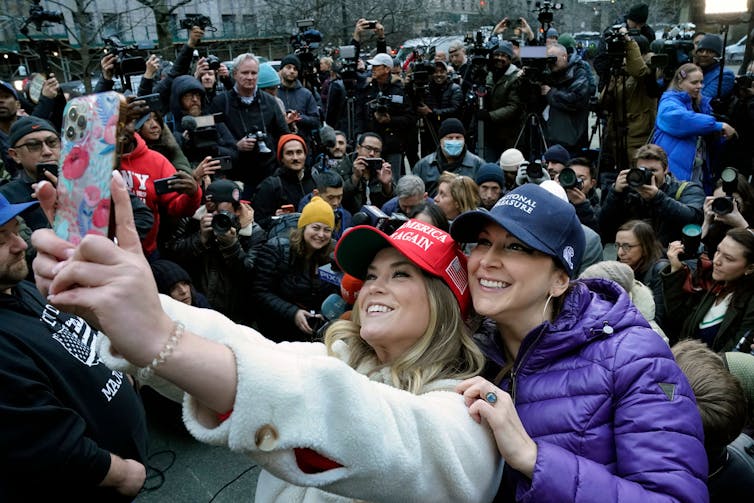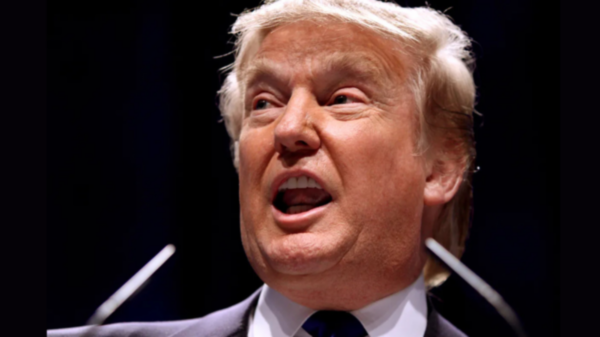
By Jonathan Schulman
Northwestern University and Matthew A Baum, Harvard Kennedy School
Despite multiple state and federal indictments, recent polling indicates that former President Donald Trump retains a commanding lead in the race for the 2024 Republican Party presidential nomination.
So it seems useful to understand who, exactly, supports Trump – and whether the multiple criminal indictments against the former president have had any effect on his nomination prospects.
We are a multiuniversity team of social scientists that has been regularly polling Americans in all 50 states since April 2020.
Our most recent survey, which ran from June 29, 2023, to Aug. 1, 2023, included 7,732 Republicans or Republican-leaning independents. We explored who, among these respondents, supports Trump in the 2024 Republican primary and how they reacted to his June 2023 indictment for withholding classified documents.
Since no other Republican candidate in our survey received more than 5% support, we focus on Trump and his nearest rival, Florida Gov. Ron DeSantis.
Consistent with recent polls, we found that Trump has a commanding 40-point lead over DeSantis.
While Trump leads DeSantis across nearly all major demographic categories, his advantage is especially large among Hispanic voters. The same is true when considering Republicans who said that they do not have higher education degrees and those who are very conservative, live in very rural places or are lower-income.
Very conservative voter support
People who identified as “very conservative” comprised 14% of the Republicans in our survey. Their support for Trump in 2024 is overwhelming: They support Trump over DeSantis by a 69-12 margin.
A recent FiveThirtyEight report showed that the most conservative Republicans were not always such strong supporters of Trump, but their support has risen substantially since Trump’s election in 2016.
Very conservative respondents were also the most likely to say that they were sure about which 2024 candidate they support. Just 5% of this group said they have not yet made up their mind, relative to 19% of moderate Republicans who were unsure of who they would vote for.
Younger support
Despite the 77-year-old Trump’s being more than three decades older than DeSantis, he enjoys significantly higher levels of support among younger Republicans.
About 53% of Republicans ages 25 to 44 said they support Trump, while just 9% of these people said they would vote for DeSantis. And 48% of even younger Republicans, ages 18 to 24, preferred Trump, as compared with 7% who support DeSantis.
In contrast, the gap between the two candidates is smaller among Republicans ages 65 and older. While 53% of this group supports Trump, 14% said they prefer DeSantis.
That said, Republicans ages 18 to 24 were significantly more likely than people in other age groups to select a candidate other than Trump or DeSantis, or to say they were not sure who they would vote for if the election were held today.

Hispanic and white voters
Trump has a large advantage over DeSantis across all racial and ethnic groups we surveyed, but especially among Hispanic and white Republicans.
We found that Trump has a 45-point advantage over DeSantis among Hispanic Republicans, who are more likely to support him than any other racial and ethnic group we investigated.
About 52% of white Republican people we polled, meanwhile, said that they support Trump, compared with 12.1% who preferred DeSantis. The gap in preference for Trump over DeSantis among other ethnic groups, including Asian Americans and Black people, was smaller.
No geographic or socioeconomic boundary
Trump has a commanding lead over DeSantis across all geographic areas, but his lead is particularly strong among Republicans in very rural communities.
Trump enjoys a massive 51-point lead over DeSantis among those who describe the area in which they live as “very rural.” Trump’s vote share among rural Americans increased from 2016 to 2020 and remains a strong base of his support leading into the 2024 primary.
Trump also holds a large lead over DeSantis regardless of socioeconomic status, but the gap widens among lower-income and less-educated Republicans.
Among Republicans with a college or graduate degree, for example, Trump led DeSantis by a 45-15 margin, which jumped up to 55-9 among those without a college degree. Trump holds a 47-point advantage among white respondents without a college degree, which shrinks to 29 points for white respondents with college degrees.
Trump’s legal woes aren’t a deciding factor
We randomly embedded an experiment into our survey in which we asked a series of questions about Trump’s recent indictment in the Mar-a-Lago classified document case before or after asking Republicans their preferred 2024 candidate.
Our goal was to test whether prompting them to think about the indictment affected respondents’ support for Trump.
Trump’s indictment has given some Republican voters pause, but this concern is not leading them to support DeSantis.
Republicans who saw Trump’s indictment as justified were significantly less likely to support Trump in the 2024 primary, but they were not more likely to support DeSantis as a result.
The effect of answering questions about Trump’s indictment immediately before, rather than after, asking about preferences for the 2024 primary was strongest among self-identified moderate Republicans, who make up 29% of the Republicans in our survey.
Among those moderate Republicans, answering questions about Trump’s indictment before the 2024 Republican primary candidate preference question decreased support for Trump by 6 percentage points.
Among the 18% of Republicans who felt that Trump’s indictment was justified, only 10% reported supporting DeSantis in 2024, compared with 25% who still backed Trump.
For conservative and very conservative Republicans, however, being prompted to think about Trump’s indictment immediately before answering the 2024 candidate preference question increased support for Trump by 3 percentage points.
This lends credence to the idea some Republicans have articulated that indictments could benefit Trump, but only among the most conservative Republicans.
The bigger picture
Our survey results show Trump with a commanding advantage over the field at this stage of the race for the 2024 Republican Party nomination.
That said, Trump’s support is not uniform across all Republicans – it is, for instance, notably higher among Republicans who identify with some of these characteristics – being less wealthy or educated, rural, older, Hispanic or white, or very conservative.
Moderate Republicans’ shift away from Trump after we reminded them about the classified documents indictment raises the possibility that additional indictments – such as the second one the Justice Department announced on Aug. 2, 2023, regarding attempts to overturn the 2020 election results – could negatively affect Trump’s campaign for the Republican nomination, particularly among moderate voters.
Of course, our findings also suggest that they may further invigorate his ideologically conservative base.
Overall, potential indictment effects notwithstanding, our findings represent a picture of overwhelming domination by Trump across virtually all facets of the Republican Party.
Jonathan Schulman, Ph.D. Candidate in Political Science, Northwestern University and Matthew A Baum, Professor of Global Communications and Professor of Public Policy, Harvard Kennedy School







You must be logged in to post a comment Login